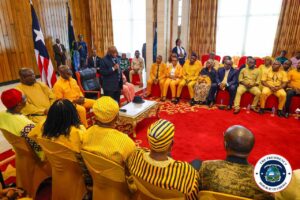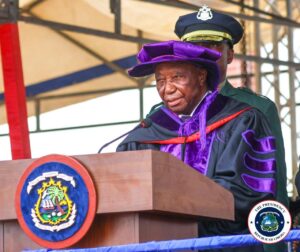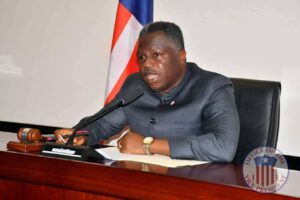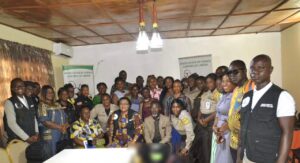ORWOCH, Partners Conclude One Day Stakeholders Inception Meeting On Women Political Participation and Legal Aid
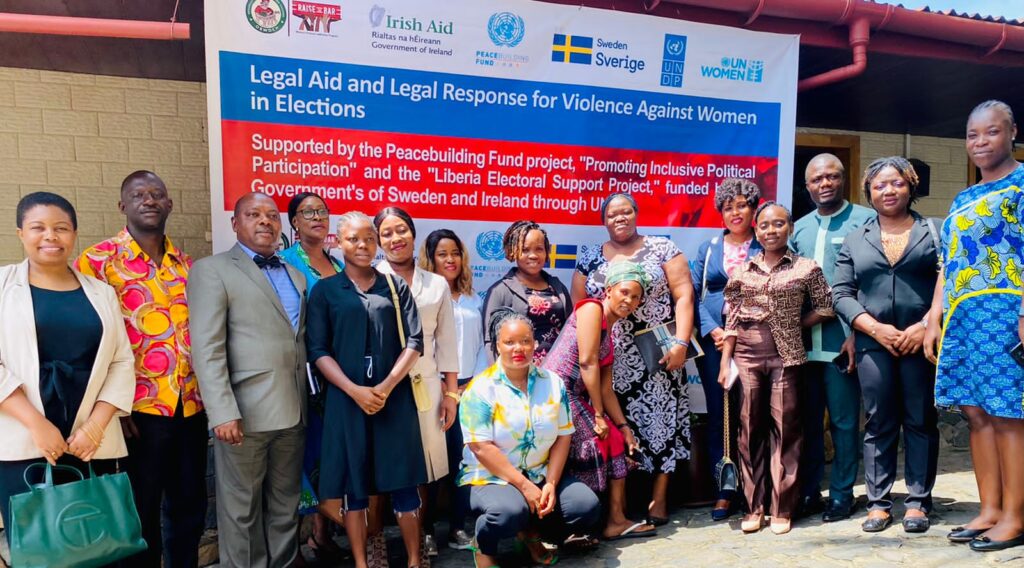
Liberia: A local women rights advocacy group named Organization for Women and Children (ORWOCH) has ended one-day stakeholders meeting to ensure legal aid and legal response for violence against women participating in the upcoming 2023 General and Presidential Elections.
The projects “Promoting Inclusive Political Participation” supported by the Peacebuilding Fund and the LIberia Electoral Support”, supported by the Governments of Sweden and Ireland through UNDP officially kick-started with the inception meeting at a local hotel in Monrovia.
With the support of the Liberia Electoral Support Project (LESP), in partnership with UN Women and UNDP, with funding from the SIDA and Irish Aid, ORWOCH will develop a concept to set up a legal aid program for disadvantaged candidates (e.g., women, Persons Living with Disability, youth, etc.) The legal aid concept (framed the VAWIE referral pathway) outlines how, where and by whom the legal aid will be provided, according to a clear set of standard operating procedures and with a proposed referral pathway for the provision of legal services to women experiencing VAWIE and disadvantaged candidates under the Liberia Elections Support Project (LESP).
As part of the inception meeting, a panel discussion comprising legal minds and women politician and activists was held to brainstorm on issues affecting women in electoral processes particularly with legal frameworks.
The lead panelist former Chief Justice Gloria Musu Scott told the gathering that women have been taking things that would hurt them during electoral processes for granted. She recounted her years in politics and her ability through the votes of the people to win through the tougher systems enabled against women.
She encouraged other women to take political issues strongly in terms of elections to include: security, and their wellbeing; as such, recommends that the issues of elections matter need brainstorming. “Chapter 10, of the elections law provides that, the National Elections Commission (NEC) should fine and revoke political parties that are found in elections violence”.
Cllr Scott added that there is a need ORWOCH look at the legal framework to make the appropriate recommendations to those actors who need to perform to ensure that the security of women are protected and the atmosphere conducive to ensure participation of women and other women politicians.
“Accordingly; women need to insist on changing the laws, laws need to be looked at, because it is critical in elections.
Always be aware of domestic violence like rape, and political violence among others; the mindset of society today is; politics and leadership belong to men so if a woman tries to go into that area, they start to dig up her stories.
The electoral process is to put Liberia back in order, the court and NEC decide cases but they see it as just another case to waste their time”, Cllr Scott averred.
Also on the Panel, Women Rights Activist, Lisa Kinderveter Sieh asserted that women must first recognize that there is a problem, a huge denial of problems that they have faced with.
She recommended to ORWOCH to review violence in the elections law, penal code, domestic violence, and other areas; stating, there are different violence against women that are hidden; stressing that, either a husband beat his wife because she attends a political scene or harassing women sexually for a job or on a job.
“We need more data collection on women’s issues to be able to explain to the public the kind of violence against women”, Lisa noted.
Giving her experience on the 2018 by-election of District number 13 in Gardnerville, Aspirant Cornelius Kruah-Togbah explained that she was not targeted as a female candidate but because she was an opposition female candidate in the election.
“You won’t see men falling prey to this often, because if it is done, that male will fight his male counterpart back, but when it is female that woman will say let’s leave it and go to a different place,” The gender part is, we are afraid to fight back as women.”
She indicated that in 2018, during her political rally, she downplayed the issue of security in politics, noting that, politics is a provocation.
Madam Kruah-Togbah expressed frustration that since the incident, there has been no redress from the National Elections Commission (NEC), the Liberia National Police (LNP), and the Judiciary Branch of Government. “The challenges until now is, no redress, no questioning from the Liberia National Police and no prosecution from the court, all of these things none of them had come out with anything.”
She ended that saying all of those will not deter her stance for being on the ballot in 2023 for Representative in District 13.
According to the National Elections Commission as stated in its Violence Against Women protocol, “observations and analysis of recent electoral processes, namely the 2020 Special Senatorial Elections, 2019 by-elections and the 2017 and 2018 elections”, there is an increase of acts of violence during elections, particularly against women candidates which constitutes a threat to peaceful forthcoming elections and the democratic process in Liberia if it is not addressed.
Violence Against Women in Elections is defined “any act or threat of an act that results in or is likely to result in physical, economic, sexual, or psychological harm or suffering to women activists, women’s human rights defenders (WHRDs), women campaigners, women voters, and women elected to or holding any public or corporate office. This includes threats of such acts, coercion or deprivation of liberty with the intent of limiting women’s rights or freedom of expression, voices and participation in elections and politics.
VAWE may be cultural, traditional, and/or religious, occurring in public and private spaces, including online (social media) and in traditional media (radio, telephone, television), in homes, political parties, communities, workplaces, and other spaces before, during and after elections, and in other political processes.”
Despite the increase, women politicians have found it difficult to find accountability for VAWIE hence, the need for a clear referral pathway.
The pathway will take into consideration the below acts of VAWIE highlighted by the protocol: Physical violence: attacks on campaign centers, assault, seizing voter’s cards, domestic violence, including wife beating/intimate partner violence, coercion and control by limiting women to domestic duties to keep them away from meetings and other political activities.
Economic violence: overspending or corporations withholding money pretending that the woman running is against their interest.
Cultural or traditional religious: denying women the right to speak in certain spaces or restricting women’s participation through the use of cultural taboos, such as putting out the Poro master or country devil.
Sexual violence: sexual harassment, exploitation, and abuse in political institutions, including blackmail; rape of women voters and campaigners; within domestic relations for the purpose of limiting women’s voices.
Psychological or emotional and verbal violence: attacks on women’s personal life including sexual and romantic life; stereotyping; insults from community members; cash violence to get women to leave political activity or campaign, organization of midnight meetings by political parties; manipulation of party primaries; etc.
Media and cyber violence: use of Information, communication and technology tools (ICT) to attack and disseminate negative campaigns against women candidates, women campaign managers, women voters, and women in elected or in decision-making positions among others.
As a feminist women-led, ORWOCH has been committed to championing the rights of women and girls, building their capacities and taking collective actions to support Liberian women and girls to claim their rights and have their voices heard, free from violence and discrimination.
ORWOCH works with women of all ages to fully participate in leadership, decision making, political activities and engaging political institutions to promote women political ambitions, addressing barriers that limit, marginalized groups (women, girls and people with disabilities) political participations.
The group seeks to demystify the political process for women to start their political careers and for the more experienced women who had to horn their skills through her Raise the Bar Political Training Program for aspiring women leaders among others.
ORWOCH has also been a forerunner on accountability and legal aid for women experiencing violence during elections and has provided legal representation to women facing violence and through the Project Accountable Safe Space (PASS) Women’s Accountability Room monitors, documents and legally addresses violence against women in election.
ORWOCH also provides legal representation to indigent women; and monitors and tracks strategic cases through the legal system; working to end violence against women and girls; and advocates for women leadership during and after humanitarian crises.
ORWOCH thematic focus is on Women’s Political Participation Ending Violence Against Women and Girls Access to Justice Feminist Humanitarian Leadership Women Economic Empowerment.
